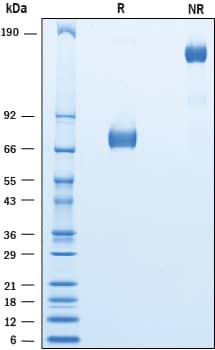Recombinant Cynomolgus CD155/PVR Fc Chimera Protein, CF
R&D Systems, part of Bio-Techne | Catalog # 10058-CD

Key Product Details
Source
HEK293
Accession #
Structure / Form
Disulfide-linked homodimer
Conjugate
Unconjugated
Applications
Bioactivity
Product Specifications
Source
Human embryonic kidney cell, HEK293-derived cynomolgus monkey CD155/PVR protein
| Cynomolgus Monkey CD155/PVR (Asp28-Asn343) Unique Sequence |
IEGRMD | Human IgG1 (Pro100-Lys330) |
| N-terminus | C-terminus |
Purity
>95%, by SDS-PAGE visualized with Silver Staining and quantitative densitometry by Coomassie® Blue Staining.
Endotoxin Level
<0.10 EU per 1 μg of the protein by the LAL method.
N-terminal Sequence Analysis
Asp28
Predicted Molecular Mass
85 kDa
SDS-PAGE
68-77 kDa, reducing conditions
Scientific Data Images for Recombinant Cynomolgus CD155/PVR Fc Chimera Protein, CF
Recombinant Cynomolgus CD155/PVR Fc Chimera Protein Binding Activity
When Recombinant Cynomolgus Monkey CD155/PVR Fc Chimera (Catalog # 10058-CD) is coated at 5 µg/mL, 100 µL/well, Recombinant Human CD96v2 Fc Chimera (Catalog # 9556-CD) binds with an ED50 of 0.25-1.25 µg/mL.Recombinant Cynomolgus CD155/PVR Fc Chimera Protein SDS-PAGE
2 μg/lane of Recombinant Cynomolgus Monkey CD155/PVR Fc Chimera was resolved with SDS-PAGE under reducing (R) and non-reducing (NR) conditions and visualized by Coomassie® Blue staining, showing bands at 68-77 kDa and 140-150 kDa, respectively.Formulation, Preparation and Storage
10058-CD
| Formulation | Lyophilized from a 0.2 μm filtered solution in PBS with Trehalose. |
| Reconstitution | Reconstitute at 500 μg/mL in PBS. |
| Shipping | The product is shipped at ambient temperature. Upon receipt, store it immediately at the temperature recommended below. |
| Stability & Storage | Use a manual defrost freezer and avoid repeated freeze-thaw cycles.
|
Background: CD155/PVR
References
- Mandai, K. et al. (2015) Curr. Top. Dev. Biol. 112:197.
- Ravens, I. et al. (2003) Biochem. Biophys. Res. Commun. 312:1364.
- Sloan, K. et al. (2004) BMC Cancer. 4:73.
- Sato, T. et al. (2004) Genes to Cells 9:791.
- Escalante, N.K. et al. (2011) Arterioscler. Thromb. Vasc. Biol. 31:1177.
- Xu, Z. and B. Jin (2010) Cell. Mol. Immunol. 7:11.
- Reymond, N. et al. (2004) J. Exp. Med. 199:1331.
- Maier, M.K. et al. (2007) Eur. J. Immunol. 37:2214.
- Lozano, E. et al. (2013) J. Immunol. 191:3673.
- Yamashita-Kanemaru, Y. et al. (2015) J. Immunol. 194:5644.
- Mueller, S. and E. Wimmer (2003) J. Biol. Chem. 278:31251.
- Chan, C.J. et al. (2010) J. Immunol. 184:902.
Long Name
Poliovirus Receptor
Alternate Names
CD155, HVED, Necl-5, PVR, PVS
Entrez Gene IDs
Gene Symbol
PVR
UniProt
Additional CD155/PVR Products
Product Documents for Recombinant Cynomolgus CD155/PVR Fc Chimera Protein, CF
Product Specific Notices for Recombinant Cynomolgus CD155/PVR Fc Chimera Protein, CF
For research use only
